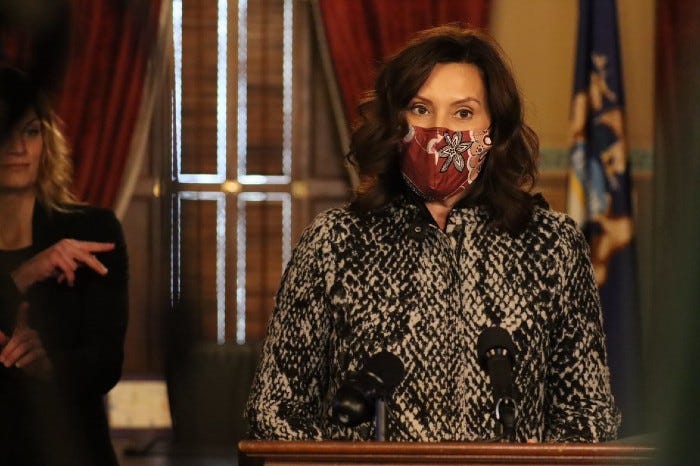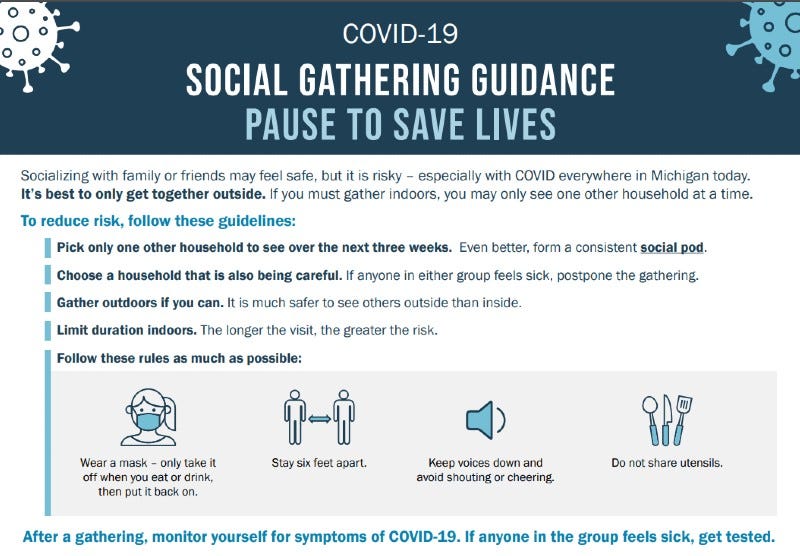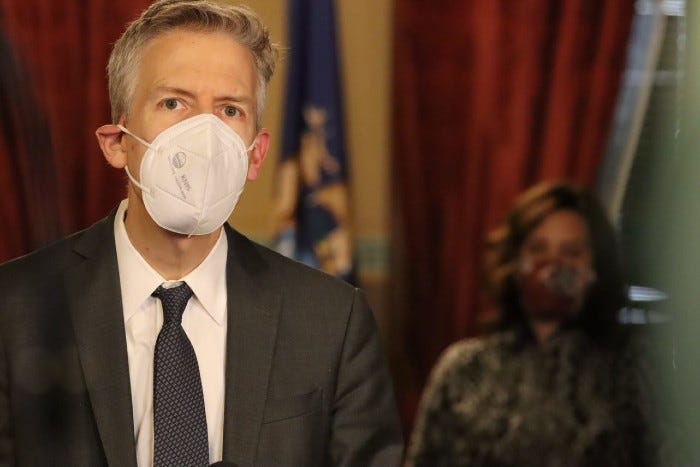
(WWJ) State officials have extended Michigan's partial shutdown, which was set to expire Tuesday night, an additional 12 days.
The order -- now in effect through Dec. 20 -- comes from Michigan Department of Health and Human Services Director Robert Gordon on Monday, while hospitals are overwhelmed across the state.
While Gov. Gretchen Whitmer lost her power to issue executive orders under a judgement by the U.S. Supreme court, MDHHS can still act during a pandemic under a law not affected by the court's decision.
Whitmer said the extension is necessary as health officials expect to see another big spike in COVID-19 cases in the coming days, after too many Michiganders traveled or gathered in groups for Thanksgiving.
“Hope is on the horizon, but we need an additional 12 days to determine the full impact of the Thanksgiving holiday on our efforts to mitigate the spread of the virus,” said Whitmer.
What's closed? The following restrictions are extended:
- Bars and restaurants must remain closed for dine-in service, but can remain open for outdoor dining, carry-out and delivery.
- Casinos, movie theaters and group exercise classes remain closed.
- Professional and college sports meeting extraordinary standards for risk mitigation may continue without spectators.
- Colleges, universities and high schools will continue with remote learning, with no in-person classes.
- Gyms are open for individual exercise only (no group classes) with mandatory masking and additional strict safety measures.
Also under Monday's order, MDHHS continues to urge families to avoid indoor gatherings, and only two households may gather inside, with strict protocols recommended. Individuals should wear masks consistently whenever they are inside with individuals not in their household, and are recommended to pick only a small group to see regularly.

At a news conference Monday afternoon, Gov. Gretchen Whitmer said when these restrictions are lifted, after Dec. 20, it will need to happen slowly.
“This is all about protecting our families and frontline workers until we eradicate this virus once and for all," the governor said. "With recent daily case counts averaging well above 6,000, the daily death toll at alarming levels and the risk of hospitals becoming overwhelmed, we must work together as Michiganders and listen to our health experts. This may be the most difficult time yet in our struggle with COVID-19, but there is light at the end of the tunnel."
What's still open? The order, which keeps existing measures in place through Dec. 20, does not include a blanket stay-home action. Employees who work in jobs that cannot be performed from home can continue to go to work, including those in manufacturing, construction and health occupations.
Outdoor gatherings, outdoor dining and parks remain open, and activities with distancing and face masks are still allowed, including: retail shopping; public transit; restaurant takeout; personal-care services such as haircuts, by appointment; and individualized exercise at a gym, with extra spacing between machines.

“We each have a personal responsibility to wear a mask consistently and minimize indoor gatherings, so we can protect our frontline heroes and loved ones,” said Gordon. “If we don’t, the disease will continue to spread and people will continue to get sick and die.”
The latest order came a couple of hours after Michigan hospital officials issued a statement saying the shutdown is working; reporting slight declines in virus-related emergency room visits, daily admissions and total hospitalizations since the order took affect three weeks ago.
“While we have seen early signs of progress in our case rates and hospitalizations, unfortunately our rates are still alarmingly high and we need more time to understand the impact that Thanksgiving travel may have had on the spread of COVID-19 in Michigan,” said Dr. Joneigh Khaldun, chief medical executive and chief deputy for health at MDHHS. “I am hopeful because vaccines will be available soon, potentially later this month. However, it will take time for the vaccine to be widely available to the general public, and it is important that we continue to do what we can to contain this virus.”
MDHHS also identified three key metrics that will be utilized in determining whether to slowly reopen at the end of the 12 days. Specifically, the department will be looking closely at the percentage of hospital beds with COVID patients, the number of COVID-19 cases and the positivity rate. With improvements in those numbers in context, MDHHS will carefully reopen, with in-person learning at high schools first. Next in line will be entertainment venues where people can maintain consistent masking, such as casinos, theaters and bowling, with concessions closed.
“The last few weeks have been critical to slowing the spread, particularly across the Upper Peninsula given the geography between hospitals and the available resources,” said Karen Cheeseman, President and CEO of Mackinac Straits Health System in St. Ignace. “We won’t see continued improvement without your help. We are asking you to heed the advice of public health experts by washing your hands, wearing your mask, and avoiding crowds.”
Just before Thanksgiving, Gov. Whitmer sent a letter to the Michigan Legislature seeking their support and asking them to pass a COVID relief package to help families and businesses across the state, which included a permanent extension of unemployment benefits. She has also called for the Legislature to pass bills to require masks in public, which has received bipartisan support, according to the Whitmer Administration.
Looking ahead, the State Budget Office last week sent the Appropriations Chairs in the Legislature an additional request to provide supplemental funding in the current budget for additional COVID response needs for testing, contact tracing, PPE, hospital staffing, support for nursing homes and veterans homes and funding to quickly begin distributing vaccines to Michigan's highest risk residents as soon as the vaccine becomes available.
Among those not happy to hear of the extension are those in the bar restaurant business, which has been devastated by pandemic restrictions.
According to a recent poll, about 50% of Michigan bars and restaurants who responded said if a ban on indoor dining lasts more than a couple of months, they will “shut down forever.”
“While we have seen early signs of progress in our case rates and hospitalizations, unfortunately our rates are still alarmingly high and we need more time to understand the impact that Thanksgiving travel may have had on the spread of COVID-19 in Michigan,” said Dr. Joneigh Khaldun, chief medical executive and chief deputy for health at MDHHS. “I am hopeful because vaccines will be available soon, potentially later this month. However, it will take time for the vaccine to be widely available to the general public, and it is important that we continue to do what we can to contain this virus.”


